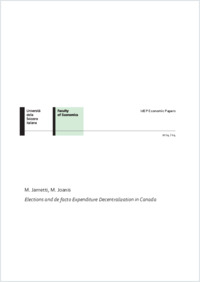Elections and de facto expenditure decentralization in Canada
- Jametti, Mario Istituto di economia politica (IdEP), Facoltà di scienze economiche, Università della Svizzera italiana, Svizzera
- Joanis, Marcelin Université de Sherbrooke, Canada
-
24.04.2014
25 p.
English
This paper empirically investigates the underlying determinants of expenditure decentralization, based on the predictions of a new political economy model of partial decentralization. The analysis is based on an agency model, in which two levels of government are involved in the provision of a public good and voters are imperfectly informed about each government's contribution to the good, creating a shared accountability problem. Under shared expenditure responsibility, the degree of decentralization is endogenous and depends on the relative political conditions prevailing at each level of government. Consistent with the model’s predictions, empirical results from a panel of Canadian provinces show that decentralization in a province increases with the electoral strength of the provincial government and decreases with the electoral strength of the federal government, in addition to being affected significantly by the partisan affiliation of both levels of government. A series of alternative empirical specifications, including an IV regression exploiting campaign spending data, are presented to assess the robustness of these results.
- Language
-
- English
- Classification
- Economics
- License
-
License undefined
- Open access status
- green
- Identifiers
-
- RERO DOC 209894
- ARK ark:/12658/srd1318460
- Persistent URL
- https://n2t.net/ark:/12658/srd1318460
Statistics
Document views: 167
File downloads:
- Texte intégral: 178
